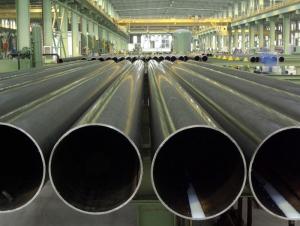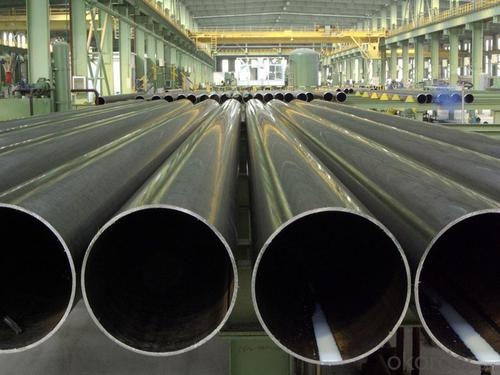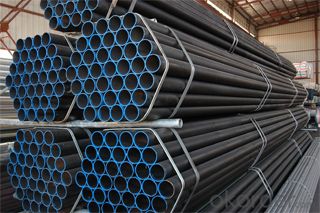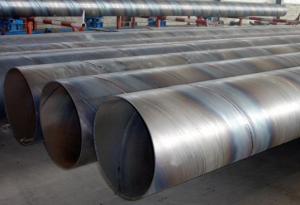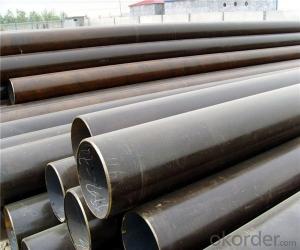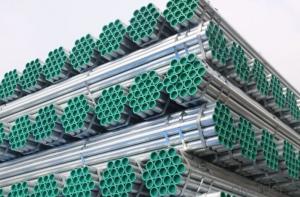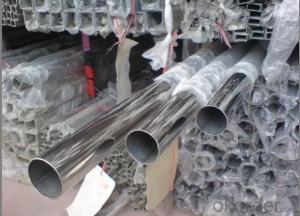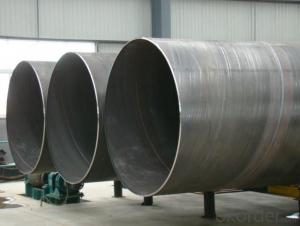High Quality Welded Steel Tubes And Pipes
- Loading Port:
- Tianjin
- Payment Terms:
- TT or LC
- Min Order Qty:
- 25 m.t.
- Supply Capability:
- 10000 m.t./month
OKorder Service Pledge
OKorder Financial Service
You Might Also Like
1、Structure of High Quality Welded Steel Tubes And Pipes:
Welded Steel Pipe is to be used for conveying gas, water, and petroleum foroil and natural gas industries. And used for structural steel pies purpose.
2、Main Features of the High Quality Welded Steel Tubes And Pipes:
• High manufacturing accuracy
• High strength
• Small inertia resistance
• Strong heat dissipation ability
• Good visual effect
• Reasonable price
3、High Quality Welded Steel Tubes And Pipes Specification:
Standard | GB, DIN, ASTM ASTM A106-2006, ASTM A53-2007 |
Grade | 10#-45#, 16Mn 10#, 20#, 45#, 16Mn |
Thickness | 8 - 33 mm |
Section Shape | Round |
Outer Diameter | 133 - 219 mm |
Place of Origin | Shandong, China (Mainland) |
Secondary Or Not | Non-secondary |
Application | Hydraulic Pipe |
Technique | Cold Drawn |
Certification | API |
Surface Treatment | factory state or painted black |
Special Pipe | API Pipe |
Alloy Or Not | Non-alloy |
Length | 5-12M |
Outer Diameter | 21.3-610mm |
Grade | 20#, 45#, Q345, API J55, API K55, API L80, API N80, API P110, A53B |
Standard | ASME, ASTM |
1) Material:20#(ASTM A 106/A53 GRB.API5LGRB,GB),45#,16Mn,10#.
2) Specification range:OD:21.3-610mm,WT:6-70mm,length:6-12m or according to the requirement of clients.
3) Excutive standards:GB,ASME API5L.ASTM A 106/A53,Despite of the above standards,we can also supply seamless steel pipe with standard of DIN,JIS,and so on,and also develop new products according to the requirements of our clients!
4) Surface:black lacquered,varnish coating or galvanized.
5) Ends:Beveled or square cut,plastic capped,painted.
6) Packing:bundles wrapped with strong steel strip,seaworthy packing.
4、Packaging & Delivery
Packaging Details: | seaworthy package,bundles wrapped with strong steel strip |
Delivery Detail: | 15-30days after received 30%TT |
5、FAQ of High Quality Welded Steel Tubes And Pipes:
①How is the quality of your products?
Our products are manufactured strictly according to national and internaional standard, and we take a test
on every pipe before delivered out. If you want see our quality certifications and all kinds of testing report, please just ask us for it.
Guaranteed: If products’ quality don’t accord to discription as we give or the promise before you place order, we promise 100% refund.
②How about price?
Yes, we are factory and be able to give you lowest price below market one, and we have a policy that “ for saving time and absolutely honest business attitude, we quote as lowest as possible for any customer, and discount can be given according to quantity”,if you like bargain and factory price is not low enough as you think, just don’t waste your time.Please trust the quotation we would give you, it is professional one.
③Why should you chose us?
Chose happens because of quality, then price, We can give you both.Additionally, we can also offer professional products inquiry, products knowledge train(for agents), smooth goods delivery, exellent customer solution proposals.Our service formula: good quality+good price+good service=customer’s trust
SGS test is available, customer inspection before shipping is welcome, third party inspection is no problem.
6、High Quality Welded Steel Tubes And Pipes Images:
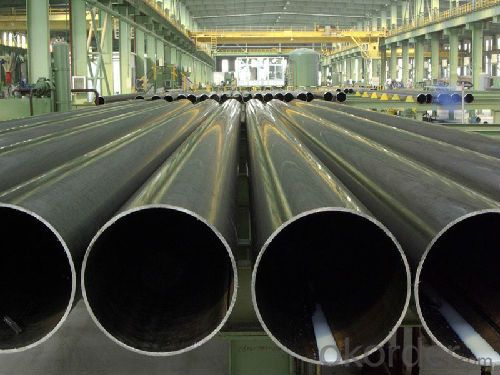
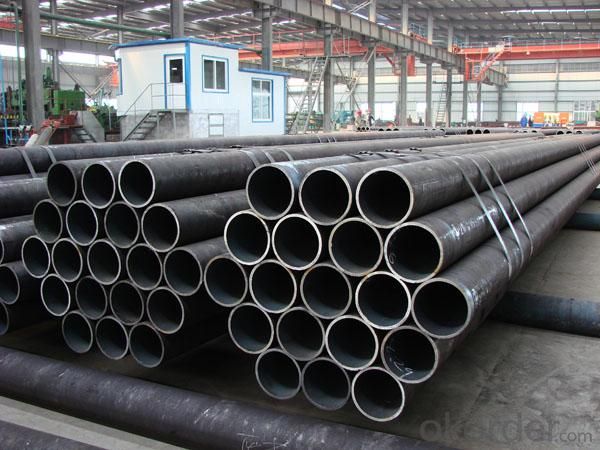
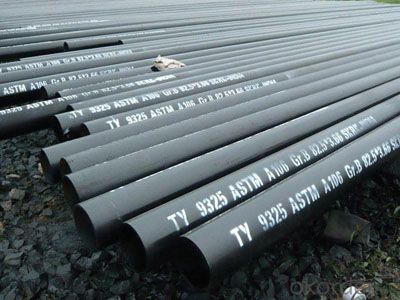
- Q: What are the different methods of pressure testing steel pipes?
- There are several different methods of pressure testing steel pipes, including hydrostatic testing, pneumatic testing, and ultrasonic testing. Hydrostatic testing involves filling the pipe with water and pressurizing it to a specified level to check for leaks or weaknesses. Pneumatic testing is similar but uses compressed air or gas instead of water. Ultrasonic testing involves using high-frequency sound waves to detect any defects or flaws in the pipe. Each method has its own advantages and is chosen based on the specific requirements and industry standards.
- Q: How are steel pipes used in the defense sector?
- Steel pipes are used in the defense sector for various purposes such as constructing military infrastructure, manufacturing weapons, and creating protective barriers. They are often utilized in the construction of military bases, ammunition storage facilities, and communication systems. Steel pipes are also crucial for manufacturing armored vehicles, artillery, and missile systems. Additionally, they are employed in creating barriers and fortifications to enhance security and defense capabilities.
- Q: What is the difference between ERW and SAW steel pipes?
- ERW (Electric Resistance Welded) steel pipes are manufactured by rolling metal sheets into a tube shape and then welding the edges together using an electric current. On the other hand, SAW (Submerged Arc Welded) steel pipes are produced by placing a metal plate in a welding machine with a submerged arc welding process. The key difference lies in the welding technique used, with ERW pipes having a welded seam along the length, while SAW pipes have a more uniform and continuous weld. This difference in welding method also affects the overall strength and durability of the pipes, making them suitable for different applications.
- Q: What are the different types of coatings used for steel pipes?
- There are several different types of coatings used for steel pipes, including epoxy coatings, polyethylene coatings, coal tar enamel coatings, and zinc coatings.
- Q: How are steel pipes used in the food and beverage industry?
- Steel pipes are commonly used in the food and beverage industry for various applications such as transporting liquids and gases, including water, beverages, and food ingredients. They are chosen for their durability, resistance to corrosion, and ability to maintain hygiene standards. Steel pipes are used to facilitate the flow of materials throughout the production process, ensuring safe and efficient operations in the food and beverage industry.
- Q: What do you mean by "SC" in welded pipe SC200? What's the diameter of 200?
- 200 refers to the diameter of the pipe. Personally, you should be an electrical professional, but the electrical specialty rarely uses the 200 pipe diameter unless it is used when the buried cable passes the road;
- Q: How are steel pipes protected against fire?
- Steel pipes are typically protected against fire through the application of fire-resistant coatings or by encasing them in fire-rated materials, such as concrete or gypsum board. Additionally, fire sprinkler systems or fire-resistant insulation may be installed around the pipes to provide an added layer of protection.
- Q: Can steel pipes be used for LNG terminals?
- Yes, steel pipes can be used for LNG terminals. Steel pipes are commonly used in the construction of LNG terminals due to their durability, strength, and resistance to extreme temperatures. Additionally, steel pipes can effectively handle the high-pressure requirements of LNG transportation and storage.
- Q: Are galvanized steel tubes the same as degaussing steel tubes?
- Degaussing steel tubeThe degaussing method specifies the following demagnetization in the established process document
- Q: What is the difference between steel pipes and polyethylene pipes?
- Steel pipes are made of a strong and durable material, steel, which makes them suitable for high-pressure and high-temperature applications. They are also resistant to corrosion, making them ideal for transporting liquids and gases. On the other hand, polyethylene pipes are made of a flexible plastic material, which makes them easier to install and handle. They are lightweight, resistant to chemicals, and have a low risk of corrosion. However, they may not be suitable for very high-pressure or high-temperature applications.
Send your message to us
High Quality Welded Steel Tubes And Pipes
- Loading Port:
- Tianjin
- Payment Terms:
- TT or LC
- Min Order Qty:
- 25 m.t.
- Supply Capability:
- 10000 m.t./month
OKorder Service Pledge
OKorder Financial Service
Similar products
Hot products
Hot Searches
Related keywords
